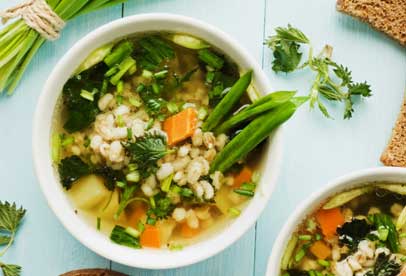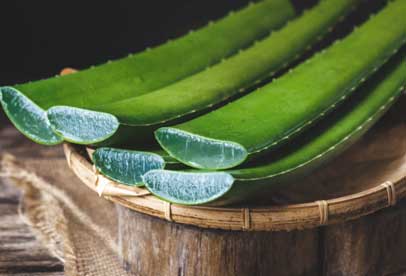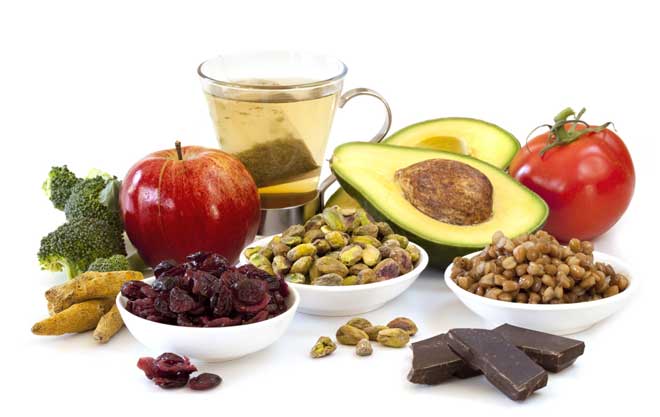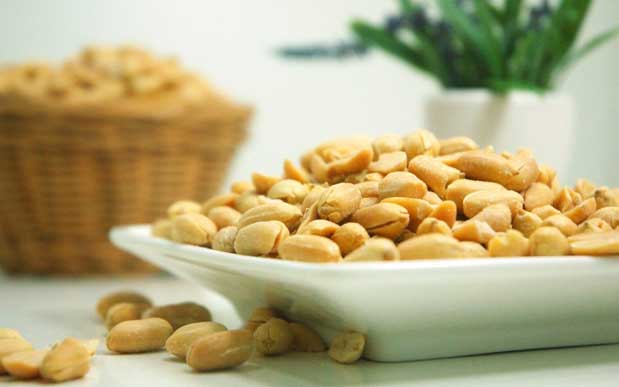
The health benefits of popular foods
Though the field of medicine continues to advance and branch out in many ways, nutritionists and health experts continue to praise the benefits of certain foods. In fact, eating healthfully has been shown to reduce the risk of obesity, cardiovascular illnesses, and even certain types of cancer.
We provide a cornucopia of delicious and nutritious options for individuals who wish to boost their health by eating healthfully. Below is a list of foods along with information regarding their potential health benefits. Note that this article contains summaries and you should click through to read individual articles containing the full list of possible health benefits.
Almonds Almonds are a rich source of vitamin E, copper, magnesium, good quality protein, and healthy unsaturated fatty acids. Studies have revealed that almonds can potentially help prevent cardiovascular diseases, cut the risk of cancer, and help prolong life.
ApplesApples are sometimes called "nutritional powerhouses" because of their impressive nutritional profile. Apples contain about 14 percent of our daily needs of Vitamin C (a powerful natural antioxidant), B-complex vitamins, dietary fiber, phytonutrients (which help protect the body from the detrimental effects of free radicals), and minerals such as calcium and potassium. Studies have revealed that eating apples can potentially help prevent dementia and reduce the risk of stroke and diabetes.
Arugula Along with other leafy greens, arugula contains very high nitrate levels (more than 250 milligrams per 100 grams). High intakes of dietary nitrate have been shown to lower blood pressure, reduce the amount of oxygen needed during exercise, and enhance athletic performance. The potential health benefits of arugula include lowering the risk of cancer, preventing osteoporosis, and improving muscle oxygenation during exercise.
Asparagus Asparagus is very rich in dietary fiber and contains high levels of vitamin B6, calcium, zinc, and magnesium. The potential health benefits of asparagus include: reducing the risk of diabetes, preventing kidney stones, and lowering the risk of neural tube defects in babies. Asparagus is also a natural diuretic, which can help with fluid balance in the body and influence blood pressure and edema.
Bananas Bananas are naturally free of fat, cholesterol, and sodium, and very rich in potassium. The potential health benefits of bananas include: lowering blood pressure, reducing the risk of developing childhood leukemia, and supporting heart health.
Basil Basil is rich in vitamin A, vitamin K, vitamin C, magnesium, iron, potassium, and calcium. Studies have revealed that basil can potentially reduce inflammation and swelling, prevent the harmful effects of aging, and may be useful in treating arthritis and inflammatory bowel diseases.
Beetroot Beetroot, also known simply as the beet, has been gaining in popularity as a new super food due to recent studies claiming that beets and beetroot juice can improve athletic performance, lower blood pressure and increase blood flow. This is partly due to its high content of nitrates, which increase nitric oxide in the body and play a substantial role in heart and vascular health. Beetroot is a rich source of folate and manganese, and also contains thiamine, riboflavin, vitamin B-6, pantothenic acid, choline, betaine, magnesium, phosphorus, potassium, zinc, copper, and selenium.
Bok choy Bok choy belongs to the cruciferous vegetable family, which also includes kale, broccoli, cauliflower, Brussels sprouts, cabbage, collard greens, rutabaga, and turnips. These nutrition powerhouses supply loads of nutrients for little calories. If you are trying to eat healthier, cruciferous vegetables like bok choy should be at the very top of your grocery list.
Broccoli Broccoli contains high levels of fiber (both soluble and insoluble) and is a rich source of vitamin C. In addition, broccoli is rich in vitamin A, iron, vitamin K, B-complex vitamins, zinc, phosphorus, and phytonutrients. Studies have found that broccoli can potentially help prevent osteoarthritis, protect skin against the effects of UV light, reverse diabetes heart damage, and reduce bladder cancer risk.
Cantaloupe Cantaloupes are also commonly known as muskmelons, mush melons, rock melons, and Persian melons. They are a member of the botanical family Cucurbitaceae, along with honeydew and watermelons. Cantaloupe contains an abundance of antioxidants, including choline, zeaxanthin, and beta-carotene, all of which protect against a range of diseases and conditions from the common cold to cancer. Potential health benefits of cantaloupe include lowering risk of developing asthma, managing blood pressure, aiding digestion, keeping hydrated, and reducing inflammation.
Carrots Carrots are a great source of vitamin A. They provide 210 percent of an average adult′s needs for the day. The potential health benefits of carrots include: preventing lung cancer, destroying leukemia cells and inhibiting their progression, and helping to restore vision.
Cauliflower Cauliflowers are a member of the brassica family, more commonly known as cruciferous vegetables. They contain antioxidants and phytonutrients that can protect against cancer. They also contain fiber that helps with satiety, weight loss, and a healthy digestive tract, choline that is essential for learning and memory, as well as many other important nutrients.
Celery Celery is a very rich source of antioxidants, electrolytes, and vitamin K. Also, thanks to its high water content, it can help rehydrate. The potential health benefits of celery include: lowering blood pressure, preventing cancer, and soothing joint pain. The potential health benefits of cauliflower include preventing mutations and reducing stress from free radicals, preventing constipation, and helping memory.
Chickpeas Originally cultivated in the Mediterranean and the Middle East, chickpeas, also known as garbanzo beans, have spread their culinary influence throughout the world. The potential health benefits of chickpeas include improved glucose levels, lipids, and insulin levels for diabetes, maintaining bone strength and heart health.
Chives Chives are a nutrient-dense food, meaning that while they are low in calories, they are high in beneficial nutrients like vitamins, minerals, and antioxidants. The potential health benefits of chives include potential beneficial and preventative effects against cancer, prostate cancer, esophageal and stomach cancer, and positive effects on sleep and mood.
Cilantro Known as coriander in the United Kingdom, cilantro comes from the plant Coriandrum sativum. In the United States, the leaves of the plant are referred to as cilantro (the Spanish translation), and the seeds are referred to as coriander. Many studies have suggested that increasing consumption of plant foods like cilantro decreases the risk of obesity, overall mortality, diabetes, and heart disease while promoting a healthy skin and hair, increased energy, and overall lower weight.
Related News

Women found to appear up to 20 years younger if they stay out of the sun

Fasting might be good for your healh, research says

Natural and healthy effects of Aloe Vera!

Top 10 Fruits To Eat To Lose Weight Quickly

Carbohydrates and sugars

How to prevent peanut allergies in children?

5 DIY masks for your various hair concerns

Medication Management Tips
Most Read
★10 Most Effective Weight Loss Exercises For Torching Fat
★Skinny jeans and big fluffy hoods contribute to back pain
★Carbohydrates and sugars
★Take care of your coloured hair with Wella
★Expert reveals the snacks you should eat, according to your body type
★How to Do Face Cleansing at Home?
★Plum goodness for your hair!
★Best foods for healthy skin
★Pasta eaters may have better diet quality: study
★Those who consume fruit and vegetables have a 40% lower risk of an incurable lung disease
★Study reveals alarming dangers of anti-ageing jabs
★Breathe Right to Live a Healthier and Better Life
★8 Best Foods to Eat for Weight Loss
★Everyday Medications You Should Never Take When You Exercise
★The Brilliant Food Combo That Helps You Burn More Fat
★Natural Ways to Remove Blackheads on Face and Nose
★How mood and eating behaviour are connected
★7 Healthy Hacks for Your Pumpkin Spice Latte
★7 Filling Foods to Keep Belly Fat at Bay
★Know why milk should be a part of your beauty regimen
★Brain health food guide for older adults
★Flex Your Memory Muscle
★Losing Weight in Hot Weather Made Easy
★Fruitylicious cure for ageing skin
★Working It Out: The future of work and digital
★Try these 4 simple yoga asanas to gain weight
★6 Best Oils for a Naturally Clear and Glowing Skin
★6 Fantastic Yoga Asanas That Will Help You Fight Skin Problems
★How to Lose Weight Fast: 3 Simple Steps, Based on Science
★5 surprising beauty benefits of amla
★6 Foods You Can Incorporate In Your Fat Burner Diet For Best Results
★How to exercise outdoors, when the smogs a killer
★Heres why you should go sulphate-free with your hair care
★Daily consumption of tea protects the elderly from cognitive decline
★Guinness World Record for bearded woman Harnaam Kaur
★Cooking in aluminium pans may be dangerous for your health
★Whole-body vibration may be as effective as regular exercise
★Tips to Even your Skin Tone Naturally
★5 Yoga Poses that Can Give You a Glowing Skin
★Hair removal injuries rocketed NINE-FOLD since 1991
★How you should wash your face?
★Growing Propagating and Using Aloe Vera
★Fresh fruits and veggies arent always healthier than frozen, scientists say
★9 Food Habits To Keep Eating To Lose Weight
★5 Tips to Take Care of Your Sensitive Skin
★Can Eating Bananas Help You Lose Weight?
★Why You Probably Shouldnt Take Diet Advice from Your CrossFit Coach
★Face Open Pores
★How your make-up bag could wreck your health
★Study finds dramatic weight loss can be achieved WITHOUT counting calories
